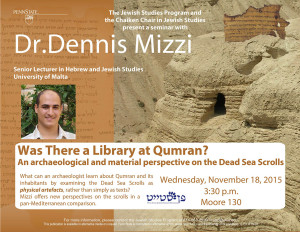Author Archives: dkf16
Trafficking Hadassah: An Africana Reading of the Book of Esther, by Dr. Ericka Dunbar.
Panel: Asian Religious Responses to COVID-19. March 3, 12:00-1:30 pm
Religious Responses to Covid-19 in the US: Roundtable
You are invited for a timely roundtable discussion on religion and Covid-19. Scholars will address pressing questions about the role religion has played in an array of responses to the pandemic within Muslim, Jewish, Evangelical, Native American, and African American communities in the US. Details are below. Please share widely with colleagues and encourage your students to attend.
Friday, Feb 12, 10:30-noon; https://psu.zoom.us/s/92238842890
Roundtable: Religious Responses to COVID-19 in the US
You are invited for a timely roundtable discussion on religion and Covid-19. Scholars will address pressing questions about the role religion has played in an array of responses to the pandemic within Muslim, Jewish, Evangelical, Native American, and African American communities in the US. Details are below. Please share widely with colleagues and encourage your students to attend.
Religious Responses to COVID-19 in the US
Friday, Feb 12, 10:30-noon
https://psu.zoom.us/s/92238842890
Speakers:
Brenda Child (University of Minnesota), “When Native Art is Medicine”
Travis Cooper (Butler University), “Evangelicals in Quarantine: Pandemic Responses Mainstream and Marginal”
Marcia Hermansen (Loyola University, Chicago), “American Muslim Negotiations of Authority in a Time of Coronavirus Precarity”
Terri Laws (University of Michigan, Dearborn), “Black Coronavirus Vaccine Hesitancy?”
Shaul Magid (Dartmouth), “Politics and Fear: Jewish Responses to COVID-19″
Questions? Contact jvanbirk@psu.edu.
Abstracts:
“When Art is Medicine,” Brenda Child (University of Minnesota) When Art is Medicine considers the origins of the Ojibwe Jingle Dress Dance tradition in the influenza pandemic of a century ago, and how the healing tradition continues to empower women across Native North America today. Child’s new documentary provides American Indian perspectives on pandemics, past and present. Jingle Dress Dancers in the Modern World has been widely used in classrooms since its September debut. https://www.youtube.com/watch?v=1F-1S71fHKs
“Evangelicals in Quarantine: Pandemic Responses Mainstream and Marginal,” Travis Cooper (Butler University) American evangelicals have seen and continue to experience a particularly fragmented response to the Covid-19 pandemic. The ongoing biomedical crisis throws into relief the social, ideological, and political tensions that threaten to undermine the existence of evangelicalism as a religious collective and social entity. At the same time, the pandemic has allowed for increased experimentation with theologically controversial digital rituals and has encouraged evangelicals in developing new, thickly mediated practices of togetherness and connectivity.
“American Muslim Negotiations of Authority in a Time of Coronavirus Precarity,” Marcia Hermansen (Loyola University, Chicago) Historians have observed that the impacts of plagues on religious communities leave in their wake long lasting or even permanent adjustments to theologies and institutions. This presentation will provide examples of both challenges to and reassertions of religious authority among American Muslims in response to recent pandemic-induced social and existential uncertainty.
“Do We Really Want to Be Made Well?” Terri Laws (University of Michigan, Dearborn) This will be a discussion of the relevance of the narrative embedded in Black coronavirus vaccine hesitancy and the social discourse that is missing from the conversation.
“Politics and Fear: Jewish Responses to COVID-19,” Shaul Magid (Dartmouth) COVID-19 is a modern-day plague and Jewish literature, from the Talmud to modern times, is replete with advice about plagues, mostly how to avoid them. But plagues also raise theological questions such as “Is this plague divinely ordained?” “Is it a punishment for sin?” “Or is this an arbitrary event?” And if so, what are the theological implications of the arbitrary? In addition, COVID also has become a political issue as well and many Jews have been compelled to believe that their communities are being treated unfairly and singled out by the authorities. The admixture of the medical, theological, and political makes for a complicated story in the Jewish communities, especially traditional ones.
Fall 2020
Wednesday 14 October 2020 12:15-1:15
Jessica Vantine Birkenholtz
Associate Professor, Departments of Women’s, Gender, and Sexuality Studies & Asian Studies
How to Hinduize a Hindu in One Text and Two Languages in Three Phases over 500 Years
(ZOOM, for link email Cathy Wanner cew10@psu.edu)
Wednesday 11 November 2020, 12:15-1:15
Nicholas de Warren
Associate Professor, Departments of Philosophy and Jewish Studies
The Trauma of the Good and the Anarchy of Forgiveness
(ZOOM, for link email Cathy Wanner cew10@psu.edu)
Was There a Library at Qumran? An Archaeological and Material Perspective on the Dead Sea Scrolls
Qumran, Dead Sea Scrolls, and Essenes: What Does Archeology Tell Us?
Christian Brady, on Ruth and Boaz in the Targum
Christian Brady, Dean of Schreyer Honors College; Associate Professor of Classics and Ancient Mediterranean Studies, and Jewish Studies, will present a paper entitled
“The Transformation of Ruth and Boaz in Targum Ruth”
on Tuesday, Dec 9, at 3:45 pm in 130 Moore
Coffee and cookies will be served!
Targum is a unique genre, offering a verbatim Aramaic rendering of the Hebrew biblical text, while weaving into it additional details and context that transforms the text often in significant ways. This paper will consider how the Targum of Ruth transformed the figures of Ruth and Boaz into paragons of rabbinic excellence.
Michael Legaspi: The Problem with Knowledge
Michael Legaspi, Associate Professor of Classics and Ancient Mediterranean Studies, and Jewish Studies, will be presenting a paper entitled
“The Problem with Knowledge: Perspectives from Classical and Biblical Traditions”
on Tuesday, October 20, 2015 at 3:30 pm in 102 Weaver. Coffee and cookies will be served!
Modern attitudes toward knowledge have been shaped in crucial ways by the Scientific Revolution and the Enlightenment. We tend to view knowledge as indispensable, the pursuit of knowledge as something natural and noble. Yet many foundational texts in Western culture present knowledge as a dangerous and problematic attainment. They prompt us to consider its limits and ambiguities and to ask whether certain forms of knowledge may actually be obstacles to human flourishing, hindrances in the pursuit of another ancient ideal: wisdom.







